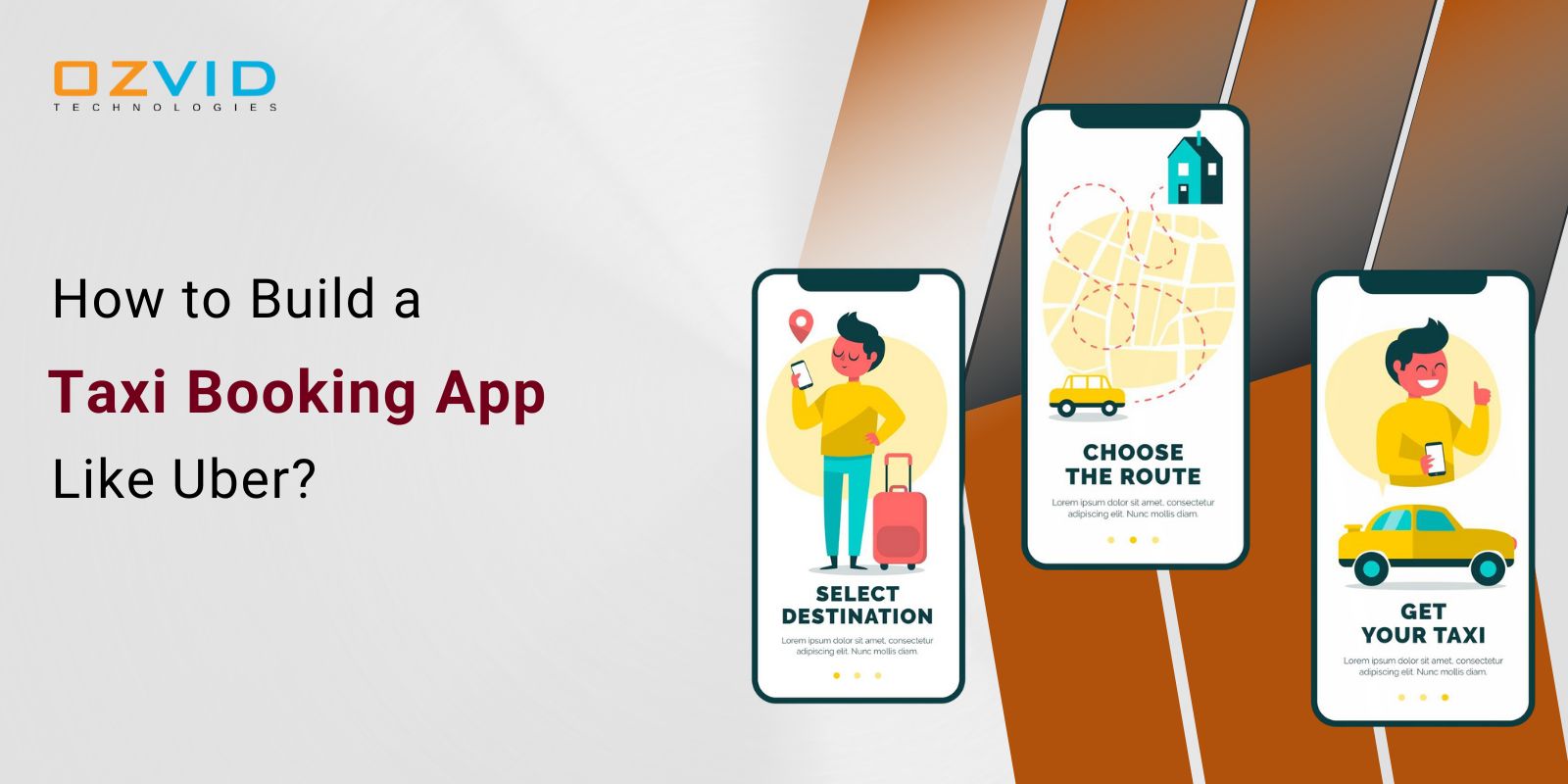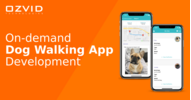- Aug 21, 2025
Share this post on:

In today’s fast-paced digital world, mobility solutions have become an essential part of our daily lives. With the growing demand for convenient transportation, the taxi booking app industry has witnessed explosive growth. Apps like Uber, Ola, and Lyft have redefined how people commute, offering reliable, affordable, and safe rides at just a tap on their smartphones.
According to Statista, the global ride-hailing market size is projected to reach over $200 billion by 2025, showcasing the tremendous growth and opportunity in this sector. Every day, millions of rides are booked worldwide via on-demand apps, proving that consumers prefer convenience, transparency, and efficiency.
For businesses, this rapid digital transformation presents a golden opportunity to enter the market with innovative solutions. Developing a taxi app or cab booking app not only helps companies expand their customer base but also provides them with long-term scalability and profitability. If you’re considering creating your own online taxi booking app, this guide provides a complete roadmap on how to build a solution similar to Uber or Ola.
At OZVID Technologies, we have years of expertise as a leading taxi booking app development company, helping businesses across the globe design, develop, and launch custom solutions that meet user expectations and market demands.
Key Takeaways
- Taxi booking apps like Uber are transforming transportation with convenience, scalability, and real-time services.
- Building a successful taxi booking application requires careful planning, features, and the right taxi app development company.
- Advanced features such as GPS tracking, in-app payments, and AI integration enhance user experience.
- The cost of taxi booking app development varies depending on features, technology, and customization.
Importance of Taxi Booking Apps
Revolutionizing Transportation
Gone are the days when passengers had to wait endlessly for roadside taxis. With the emergence of taxi apps and cab taxi apps, users can book a ride within seconds and track drivers in real time. This ease of access has transformed urban transportation.
Customer Convenience
The convenience offered by an online cab booking app lies in its ability to provide cashless transactions, GPS-based tracking, estimated fares, and reliable driver details. It reduces waiting time, ensures transparency, and offers passengers greater control over their travel.
Growth of the Industry
The taxi industry has become one of the fastest-growing digital service markets. From ola cab booking to uber cab booking, the trend shows how digital platforms dominate passenger preferences. Businesses leveraging taxi app development services stand to gain a competitive advantage in this booming industry.
Business Opportunities
For startups, investing in taxi booking app development opens doors to scalable business opportunities. With the right strategy, a cab booking application can generate revenue through commissions, surge pricing, driver subscriptions, and in-app advertisements.
How to Develop a Taxi Booking App Like Uber?
Developing a taxi booking app like Uber is a multi-stage process that requires a blend of market research, technology expertise, and innovative design. It is not just about creating a digital platform where passengers can book rides, but also about building an ecosystem that connects riders, drivers, and administrators seamlessly. Below is a detailed breakdown of how a taxi booking app development company approaches the process.
1. Conduct Comprehensive Market Research
Every successful taxi booking application begins with an in-depth study of the market. Before investing resources into taxi app development, businesses need to evaluate:
- Who the target audience is (daily commuters, corporate professionals, tourists, etc.).
- What competitors like Uber, Ola, and Lyft are offering through their online cab booking apps.
- What gaps exist in the current cab booking app market, such as local languages, affordability, or eco-friendly options.
This phase provides clarity about the features to prioritize and helps shape the app’s unique selling point (USP).
2. Define a Scalable Business Model
The next step involves selecting the right business model. A taxi booking app development company ensures that the revenue strategy is sustainable and scalable. Some common models include:
- Commission-Based: A percentage of every ride goes to the platform.
- Subscription Model: Drivers pay a fixed amount to use the cab taxi app.
- Surge Pricing: Prices increase during peak hours or high demand.
- Advertising and Partnerships: Displaying ads or partnering with brands to generate additional revenue.
Uber and ola cab booking platforms thrive on a hybrid of these strategies, and startups can adapt similar approaches.
3. Select the Right Technology Stack
The technology stack forms the backbone of the taxi booking app development process. For front-end development, frameworks like React Native or Flutter ensure apps run smoothly across platforms. Back-end technologies such as Node.js, Python, and Firebase provide robust data management.
Key integrations include:
- GPS and Maps APIs for location tracking.
- Payment Gateways for secure online transactions.
- Push Notifications for real-time alerts.
- Cloud Services for scalability of the online taxi booking app.
Choosing the right technology not only ensures smooth performance but also enhances the scalability of the cab booking application.
4. Build Core App Components
A full-fledged taxi booking application generally consists of three interconnected panels:
- Passenger Panel: Allows users to register, book rides, track drivers, and make payments.
- Driver Panel: Enables drivers to accept rides, navigate routes, and view earnings.
- Admin Panel: Acts as the control center for managing users, monitoring rides, and analyzing data.
Each panel must be developed with user-friendly interfaces to ensure maximum adoption.
5. Develop and Launch an MVP
Before building the advanced version, most companies start with an MVP (Minimum Viable Product). This basic version of the taxi app includes essential features like registration, booking, payments, and notifications. Launching an MVP allows businesses to:
- Test the functionality of their car booking app.
- Gather user feedback quickly.
- Minimize risks and reduce upfront costs.
Based on feedback, additional features such as loyalty rewards, chat support, or multi-language support can be integrated.
6. Prioritize Security and Compliance
Data protection and safety are critical in taxi app development. Features like encrypted payments, GDPR compliance, SOS alerts, and driver background checks enhance trust. As seen in olacabs booking, safety features significantly impact user retention and credibility.
7. Testing and Quality Assurance
Before launching, extensive testing ensures that the cab taxi app functions smoothly under different conditions. Functional testing, security testing, and performance testing help detect and fix bugs early. A reliable taxi app development company always emphasizes QA to guarantee a flawless user experience.
8. Post-Launch Support and Maintenance
App development doesn’t end with the launch. Continuous maintenance, updates, and bug fixes are vital for keeping the taxi booking app competitive. Regular upgrades, such as integrating electric vehicles or AI-driven route optimization, help businesses stay ahead of the curve.
Features of Taxi Booking App
When building a taxi booking app, it’s important to include features that make the platform simple, reliable, and efficient for riders, drivers, and administrators. A successful taxi booking application balances convenience, safety, and performance, ensuring an enjoyable experience for everyone involved. Below is a comprehensive look at the must-have features.
Passenger App Features
User-Friendly Registration and Login: Quick sign-up using email, phone number, or social accounts ensures hassle-free onboarding for new passengers.
Real-Time GPS Tracking: Accurate location tracking lets riders view nearby drivers, estimated arrival times, and live ride progress.
Multiple Payment Gateways: Support for cards, wallets, UPI, and cash enhances flexibility and payment convenience.
Fare Estimation & Ride Scheduling: Passengers can view estimated fares and book rides instantly or schedule them for future trips.
Safety and Ratings System: SOS button, ride-sharing with family, and a driver/passenger rating system ensure trust and reliability.
Driver App Feature:
Driver Profile & Document Verification: Profiles with personal details, licenses, and vehicle information build accountability and safety.
Trip Request Management: Drivers can accept, reject, or manage trip requests with real-time notifications.
Navigation & Route Optimization: Built-in GPS provides optimized routes, traffic alerts, and time-saving navigation.
Earnings Dashboard: Detailed reports on earnings, trip history, and payment summaries improve financial transparency.
Availability Toggle: Drivers can mark themselves online or offline, giving flexibility in working hours.
Admin Panel Features
Centralized Dashboard: An advanced control panel helps monitor drivers, passengers, rides, and overall business performance.
User & Driver Management: Admins verify documents, handle complaints, and manage both passenger and driver profiles.
Analytics & Reporting: Detailed insights into revenue, active users, and ride statistics support strategic decisions.
Promotions & Discounts: Tools for creating promo codes, offers, and referral campaigns to attract and retain customers.
Payment & Commission Control: Admins oversee transactions, driver payouts, and commission percentages for sustainable business growth.
Benefits of Taxi Booking App
The rise of taxi booking apps has redefined the transportation industry by offering value to customers, drivers, and businesses alike. From ease of use to revenue generation, these apps are designed to serve multiple stakeholders while ensuring long-term sustainability. Below are the detailed benefits of investing in a taxi booking application:
1. Benefits for Customers
Convenience and Accessibility
A cab booking app provides unmatched convenience, allowing users to book rides anytime, anywhere, with just a few taps. Unlike traditional taxis, customers don’t have to wait on streets or call local services. With features like real-time tracking, instant fare estimation, and easy booking, passengers enjoy a hassle-free travel experience tailored to their schedules and needs.
Transparency and Fair Pricing
One of the most attractive benefits of an online cab booking app is transparency in pricing. Passengers receive fare estimates upfront before confirming rides, eliminating the guesswork often associated with traditional taxis. This system builds trust and ensures passengers know exactly what they are paying for, avoiding hidden charges and disputes.
Enhanced Safety and Security
A modern online taxi booking app integrates safety features like SOS buttons, real-time trip sharing, and driver background verification. These features give passengers peace of mind, knowing they can travel safely at any time of day. Verified driver profiles and two-way rating systems further strengthen the sense of trust between riders and drivers.
Multiple Payment Options
Today’s passengers prefer flexibility when paying for rides. A car booking app integrates multiple payment gateways, including debit/credit cards, e-wallets, UPI, and even cash options. This variety ensures customers can pay through their preferred method, enhancing overall user satisfaction while promoting seamless digital transactions.
2. Benefits for Drivers
Increased Earning Opportunities
Drivers gain access to a larger pool of ride requests through a cab taxi app. Unlike traditional taxi services, where demand is inconsistent, drivers using a digital platform receive regular bookings, ensuring steady income. They can also increase earnings during peak hours through surge pricing features.
Flexibility in Work Schedule
With an online cab booking app, drivers have the freedom to choose their working hours. This flexibility means they can balance personal commitments while still earning effectively. The app also allows drivers to accept or decline rides based on location, timing, and preferences, making their work more manageable.
Improved Efficiency with Technology
GPS navigation, route optimization, and real-time updates allow drivers to reach customers faster while reducing fuel consumption and time wastage. A cab booking application empowers drivers with data-driven insights into completed rides, earnings, and performance, which helps improve efficiency and profitability in the long run.
Fair Review and Rating System
The two-way feedback mechanism ensures that drivers are recognized for their professionalism and quality of service. Positive reviews build credibility, helping drivers secure more bookings. This fair system of ratings also protects drivers by holding passengers accountable for their behavior.
3. Benefits for Businesses
Revenue Growth Opportunities
For entrepreneurs and companies, a taxi booking app development company can design platforms that generate multiple revenue streams. These include commissions from drivers, ride surge pricing, premium memberships, and even advertising partnerships. With scalability, the app can expand into new markets and diversify income sources.
Stronger Customer Engagement
A taxi app development project helps businesses engage customers more effectively through push notifications, loyalty rewards, and promotional offers. Personalized experiences based on user preferences improve retention rates and encourage repeat bookings, resulting in higher lifetime customer value.
Data Analytics and Insights
A taxi app provides businesses with rich data on customer behavior, travel patterns, and driver performance. By analyzing these insights, companies can make informed decisions, enhance services, and optimize marketing campaigns. This data-driven approach makes a cab booking app an invaluable tool for long-term growth.
Scalability and Expansion
Unlike traditional taxi services, a digital taxi booking application is highly scalable. Businesses can easily expand into new cities or regions by adding drivers and tailoring services to local demands. A robust platform ensures seamless handling of thousands of concurrent users without disruptions.
How Much Does It Cost to Develop a Taxi Booking App?
The cost of developing a taxi booking app is one of the most critical factors businesses consider before entering the market. Just like Uber or Ola, building a reliable and scalable cab taxi app involves multiple stages, each of which contributes to the overall budget. The cost is not fixed—it varies based on functionality, features, design, and technology choices. Below are the major elements that affect the pricing of taxi application development:
1. App Complexity and Features
The number and type of features have the biggest impact on cost. A basic online taxi booking app with core features like booking, payments, and GPS tracking can be relatively affordable. However, an advanced cab booking application with AI-driven recommendations, loyalty programs, real-time analytics, and multi-language support requires more development hours, leading to higher costs.
Basic MVP App: Estimated between $20,000–$40,000.
Mid-Level App: Estimated between $40,000–$80,000 with advanced features.
Enterprise-Grade App: Estimated $100,000+ with full customization and premium integrations.
2. Platform Selection
Whether the app is built for iOS, Android, or both significantly impacts cost. A native taxi app for each platform requires separate development efforts, while cross-platform frameworks like Flutter or React Native can reduce costs by enabling a single codebase for multiple platforms.
3. UI/UX Design
User experience is vital for the success of any taxi booking application. A clean, intuitive interface with seamless navigation demands expert design skills. Customized designs, animations, and interactive dashboards increase costs but ensure customer retention and satisfaction.
4. Backend Development and Server Costs
A robust backend is essential for handling real-time bookings, payments, notifications, and GPS tracking. Cloud services, APIs, and database integration add to the expenses. As the car booking app scales, server costs also rise to accommodate higher user traffic.
5. Integration of Third-Party Services
To ensure convenience and security, features like payment gateways, SMS alerts, in-app chat, and map integrations rely on third-party services. Each integration brings additional licensing or subscription costs.
6. Testing and Quality Assurance
Thorough testing is crucial for eliminating bugs and ensuring smooth performance. Quality assurance adds to the development timeline and overall budget, but it prevents costly issues after launch.
7. Maintenance and Updates
The cost doesn’t end at launch. Regular updates, bug fixes, and feature enhancements require ongoing investment. On average, maintenance can account for 15–20% of the initial taxi app development cost annually.
Final Estimate
Taking these factors into account, the cost of a taxi booking app development project can range widely, from $20,000 for a simple MVP to $120,000+ for a full-featured cab booking app with advanced technologies. Choosing the right taxi app development company ensures transparency in pricing and guarantees a product that meets business expectations.
Category | Description | Estimated Cost Range (USD) |
|---|---|---|
UI/UX Design | Wireframing, prototyping, interactive screens, branding, and customer-focused layouts. | $3,000 – $8,000 |
Frontend Development | Development of rider and driver apps (Android/iOS or cross-platform using Flutter/React Native). | $8,000 – $25,000 |
Backend Development | Server setup, APIs, database management, user accounts, and real-time functionality. | $7,000 – $20,000 |
Core Features | Booking system, GPS integration, notifications, fare calculator, ratings, and ride history. | $10,000 – $30,000 |
Advanced Features | AI/ML integration, loyalty programs, chat support, multi-language, and advanced analytics. | $15,000 – $40,000 |
Third-Party Integrations | Payment gateways, SMS/Email services, map services, and in-app communication tools. | $3,000 – $10,000 |
Testing & QA | Functional testing, bug fixing, performance optimization, and security audits. | $4,000 – $12,000 |
Deployment | App store submissions, configuration, compliance checks, and hosting setup. | $2,000 – $5,000 |
Maintenance & Updates | Ongoing support, feature enhancements, and compatibility updates. | $5,000 – $15,000 annually |
Future Trends in Taxi Booking App
The taxi booking app industry is evolving rapidly, driven by technological innovation, customer expectations, and sustainability goals. Businesses planning to invest in taxi app development services must be aware of emerging trends to remain competitive and future-ready. Below are some of the most impactful future trends shaping the development of cab booking applications and online taxi booking apps.
1. Artificial Intelligence and Machine Learning
AI and machine learning will make taxi booking apps smarter by predicting peak demands, optimizing driver allocation, and personalizing user journeys. These technologies also power chatbots for quick support, fraud detection systems, and intelligent pricing models, helping businesses deliver efficient, user-friendly, and reliable taxi app development services.
2. Autonomous Vehicles and Self-Driving Taxis
The introduction of autonomous vehicles will redefine cab taxi apps by reducing dependence on human drivers. Self-driving taxis ensure 24/7 service availability, lower operating costs, and improved efficiency. Though regulations remain a challenge, integrating this innovation into taxi application development could revolutionize the future of ride-hailing platforms worldwide.
3. Electric Vehicle Integration
Sustainability trends are driving the integration of electric vehicles into online taxi booking apps. EV taxis provide eco-friendly rides, reduce emissions, and cut long-term costs. Future apps may offer special EV ride options, charging station locators, and rewards for green choices, enhancing customer appeal and brand reputation.
4. Blockchain for Secure Transactions
Blockchain adds transparency and trust to taxi booking applications by securing payments and automating driver payouts with smart contracts. It minimizes fraud risks, protects passenger data, and ensures fair pricing. For any taxi booking app development company, blockchain will become a competitive advantage in building safe, scalable platforms.
5. Advanced Safety Features
Passenger safety will remain a cornerstone of taxi app development. Innovations like biometric verification, driver behavior monitoring, AI-based ride tracking, and SOS alerts will enhance protection. By implementing advanced safety measures, cab booking applications will build stronger trust and provide riders with confidence throughout their travel experiences.
6. Multi-Service Platforms
Future cab taxi apps won’t focus solely on transportation but expand into multi-service platforms. They’ll integrate ride-hailing, parcel delivery, food delivery, and car rentals under one ecosystem. This diversification increases customer engagement, drives higher revenue, and creates more versatile online cab booking apps for businesses and users alike.
7. Voice and Virtual Assistant Integration
Voice technology will simplify cab booking applications by allowing users to book, reschedule, or cancel rides through commands on Siri, Alexa, or Google Assistant. This feature enhances accessibility, saves time, and caters to diverse users, making online taxi booking apps more interactive and future-ready in daily commuting.
8. Data-Driven Personalization
Personalization will dominate taxi app development services by analyzing ride history, frequently traveled routes, and payment preferences. Apps will offer tailored discounts, loyalty rewards, and ride suggestions. This data-driven approach ensures better customer satisfaction, higher retention rates, and creates a strong competitive edge in the taxi application development market.
9. Expansion of Rural and Semi-Urban Services
While most cab booking apps serve urban areas, expansion into rural and semi-urban regions will be the next big step. Affordable online taxi booking apps will bridge mobility gaps, create new income opportunities for drivers, and open profitable markets for businesses, ensuring greater reach and inclusivity.
10. Augmented Reality for Enhanced Navigation
AR will transform taxi booking app development with advanced navigation and immersive features. Drivers can access real-time AR maps for better routing, while passengers may visualize driver locations and cars using AR overlays. This innovation improves user experience, ensures accuracy, and enhances the appeal of cab taxi apps.
Why Choose OZVID Technologies for Taxi Booking App Development?
Selecting the right partner is the most critical step in building a powerful taxi booking application. OZVID Technologies is a trusted taxi booking app development company with years of expertise in crafting scalable, feature-rich, and user-friendly solutions for global businesses.
1. Proven Expertise in Taxi App Development
OZVID Technologies has successfully delivered multiple taxi booking app development projects, ensuring tailored solutions for startups, enterprises, and established cab service providers.
2. End-to-End Development Services
From idea validation, UI/UX design, and feature integration to launch and post-launch support, OZVID offers complete taxi app development services under one roof.
3. Cutting-Edge Technology Stack
We leverage the latest frameworks and tools, including Flutter, React Native, and AI-based solutions, to build secure, scalable, and future-ready cab booking applications.
4. Customized and Scalable Solutions
Every business is unique, and so are its requirements. Our team develops personalized online cab booking apps that scale with your growing user base and business expansion.
5. Focus on User-Centric Experience
Our designs emphasize simplicity, speed, and reliability, ensuring both drivers and riders enjoy a seamless experience while using the taxi booking application.
6. Competitive Pricing and Timely Delivery
We combine high-quality development practices with affordable pricing models, helping businesses launch their cab taxi app on time without exceeding budgets.
Conclusion
The rising popularity of ride-hailing solutions shows how much convenience and innovation drive customer choices. Building a taxi booking app like Uber requires a clear strategy, modern technology, and a strong focus on user experience, safety, and scalability. With features like real-time tracking, secure payments, and personalized rides, these apps continue to transform urban mobility. As trends like AI, EV integration, and autonomous vehicles shape the future, businesses that invest in advanced taxi app development today will gain a competitive edge tomorrow. Partnering with the right development team ensures your idea evolves into a powerful, future-ready platform that connects riders and drivers seamlessly. Contact us today.
Frequently Asked Questions (FAQs)
1. How long does it usually take to develop a taxi booking app?
Development timelines vary based on features and complexity. A basic version may take 3–4 months, while a fully customized solution with advanced features like AI integration, analytics, and multi-language support can extend to 6–9 months.
2. How does the business model of a taxi booking app work?
The business model relies on connecting riders with drivers through a digital platform. Revenue comes from ride commissions, surge pricing, subscription models for drivers, and promotional partnerships, ensuring sustainability and continuous growth in a competitive marketplace.
3. How can safety and security be ensured in a taxi booking app?
Safety can be strengthened through driver background checks, SOS buttons, real-time location sharing, and encrypted payments. Continuous monitoring and two-way feedback also contribute to building trust among riders and drivers within the digital ecosystem.
4. What role does GPS play in a taxi booking application?
GPS enables precise location tracking, route optimization, and estimated time of arrival. It also assists drivers in finding the shortest routes, reduces waiting times, and provides riders with real-time updates, ensuring seamless and efficient ride experiences.
5. How can advanced technologies like AI and machine learning improve taxi booking apps?
AI and machine learning improve predictive analytics for demand forecasting, optimize routes, enhance dynamic pricing, and deliver personalized user experiences. These technologies also help in fraud detection, driver allocation efficiency, and overall operational excellence.










